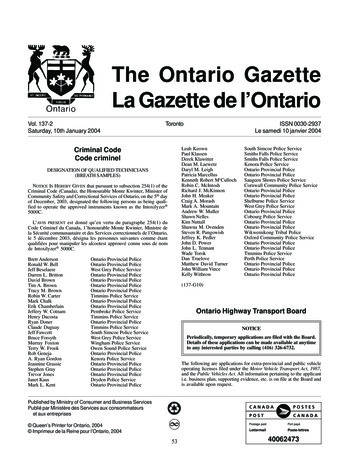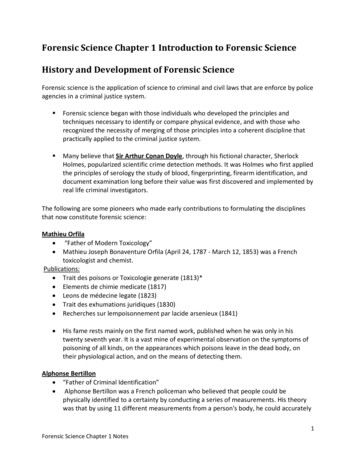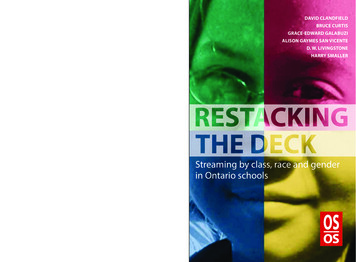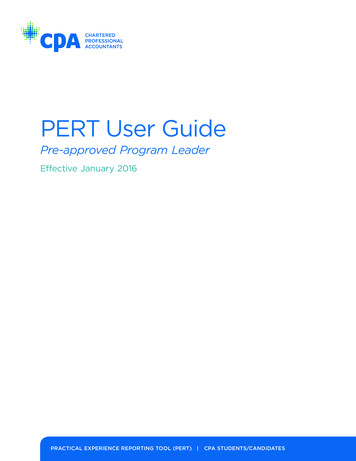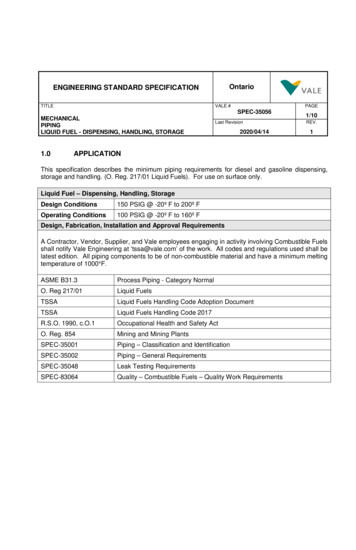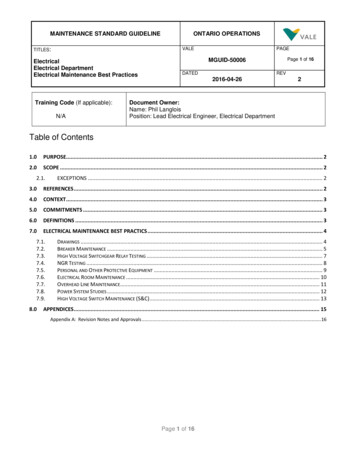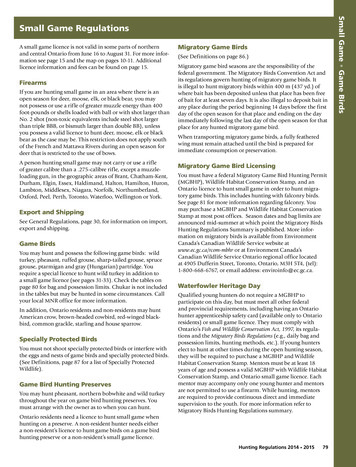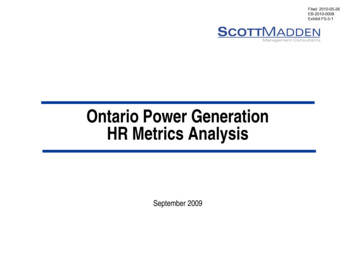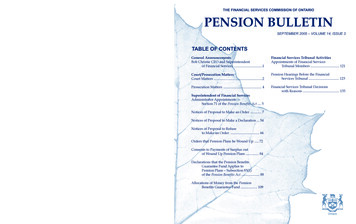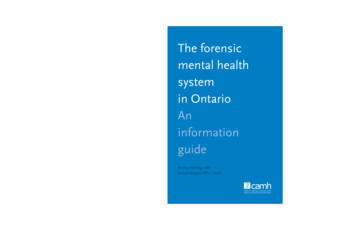
Transcription
The forensic mental health system in Ontario An information guideThis book is a guide to the forensic mental health system inOntario. If you, or someone you know, has a mental illness andhas come into contact with the law, this book will help you tounderstand what is happening.The forensic mental health system is the place where the mentalhealth system and the criminal justice system meet. It can be aconfusing and frightening place for people who have a mental illness.This guide explains how people enter and leave the forensic mentalhealth system, treatment in the system, and the rights of peoplewho are involved in the system. It also looks at the work of theOntario Review Board, which is responsible for making decisionsabout people within the forensic mental health system.This publication may be available in other formats.For information about alternate formats or othercamh publications, or to place an order, please contactSales and Distribution:Toll-free: 1 800 661-1111Toronto: 416 595-6059E-mail: publications@camh.netOnline store: http://store.camh.netWebsite: www.camh.netISBN 978-1-77052-627-3A Pan American Health Organization /World Health Organization Collaborating Centre3973l / 01-2012 / PM031Disponible en français.The forensicmental healthsystemin OntarioAninformationguideShannon Bettridge, MAHoward Barbaree, PhD, C.Psych.
iThe forensicmental healthsystemin OntarioAninformationguideShannon Bettridge, MAHoward Barbaree, PhD, C.Psych.Un Centre collaborateur de l’Organisation panaméricaine de la Santéet de l’Organisation mondiale de la Santé
National Library of Canada Cataloguing in PublicationBettridge, ShannonThe forensic mental health system in Ontario : an information guide /Shannon Bettridge, Howard Barbaree.1. Forensic psychiatry–Ontario. I. Barbaree, Howard, 1946II. Centre for Addiction and Mental Health III. Title.RA1151.B48 2004614’.15’09713C2004-901321-1isbn: 978-1-77052-627-3 (print)isbn: 978-1-77052-628-0 (pdf)isbn: 978-1-77052-629-7 (html)isbn: 978-1-77052-630-3 (epub)pm031Printed in CanadaCopyright 2004, 2008, Centre for Addiction and Mental HealthNo part of this work may be reproduced or transmitted in any form or by any meanselectronic or mechanical, including photocopying and recording, or by any informationstorage and retrieval system without written permission from the publisher—except fora brief quotation (not to exceed 200 words) in a review or professional work.This publication may be available in other formats. For information aboutalternate formats, or other camh publications, or to place an order, please contactSales and Distribution:Toll-free: 1 800 661-1111Toronto: 416 595-6059E-mail: publications@camh.netOnline store: http://store.camh.netWeb site: www.camh.netDisponible en français sous le titre :Le système ontarien de services psychiatriques médico-légaux : Guide d’informationThis guide was produced by the following:Development: Andrew Johnson, camhEditorial: Sue McCluskey, camh; Sally McBeth, Clear Language and Design;Nick Gamble, camhDesign: Nancy Leung, camhPrint production: Christine Harris, camh3973l / 01-2012 / PM031j23
ContentsAcknowledgments v1Introduction 1What is the forensic mental health system?How to use this guideWhere to go for more informationWhy do we have a forensic mental health system?Myths about mental illness2Who works in the forensic mental health system? 63 What happens inside the forensic mental healthsystem? 12The Criminal Code of Canada and the Mental Health ActHow do people enter the forensic mental health system?What happens after a person is arrested?Being held in the hospitalGetting a forensic assessmentDetermining Fitness to Stand TrialFitness to Stand Trial and Treatment OrdersDetermining Criminal ResponsibilityWhat happens during a forensic assessment?Refusing to take part in a forensic assessmentThe court’s decision4The Ontario Review Board (ORB) 23What is the Ontario Review Board (orb)?When will I have my first hearing?What happens in the orb hearing?The court found me Not Criminally Responsible (ncr). What canthe orb decide about me?The court found me Unfit to Stand Trial. What can the orb decideabout me?What happens after the hearing?How long can the orb keep me in the hospital?What hospital will I go to?
The forensic mental health system in Ontario: An information guidePrivileges in my dispositionPreparing for an orb hearingHow does the orb make its decisions?Appealing an orb decision5 Accepting or refusing treatment in the forensicmental health system 33Incapacity to accept or refuse treatmentSubstitute decision makers (sdms)Going to the Consent and Capacity Board6Living in a forensic mental health setting 36Where can I turn for help if I feel I am being treated unfairly?Getting help for other problemsLanguage and interpretersHuman rights in the forensic mental health systemYour rights as a patient under the authority of the Ontario ReviewBoard (orb)7 Family, friends and the forensic mental healthsystem 41Why does it seem so hard to get help?Supporting someone in the forensic mental health systemVisiting a jail or hospital8Leaving the forensic mental health system 44Ending the relationship with the Ontario Review Board (orb)Staying connected to community resourcesConclusion 46Glossary 47Where to go for more information 53
vAcknowledgmentsThe Centre for Addiction and Mental Health (camh) wishes toacknowledge the patients, families and professionals who helpedto create this resource. Their expertise in the forensic mentalhealth system has helped to make this an informative resource.Their commitment to providing clear, accessible information tothose who need it deserves our thanks. Any shortcomings in thisresource are solely the responsibility of camh.We acknowledge the contribution of Dr. Sandy Simpson, ClinicalDirector, and other staff of camh’s Law and Mental Health Program,who reviewed this text in 2011 and made numerous small butsignificant improvements.
viThe forensic mental health system in ontario An information guide
11 IntroductionThis guide will help you learn about the forensic mental healthsystem in Ontario. If you, or someone you know, has a mentalillness and has come into contact with the law, you should readthis guide.What is the forensic mental healthsystem?The mental health system is the network of people and servicesthat care for people with mental illness. The criminal justicesystem includes the courts, the institutions and the professionalsthat deal with people accused or convicted of crimes. If you have amental illness and you come into contact with the law, you couldbecome involved with the forensic mental health system.In this guide, “forensic” means “connected to the law or the courts.”“Mental illness” is a very broad term that can mean many things.People who have symptoms of a mental illness sometimes havetrouble knowing what is real. Sometimes they hear or see thingsthat other people don’t hear or see. Sometimes they have thoughtsor beliefs that are not logical or true, but they can’t stop thinkingabout them. Mental illness includes psychotic illnesses such as
2The forensic mental health system in Ontario: An information guideschizophrenia and mood problems such as bipolar disorder andmajor depression. Some people have what is called a “dual diagnosis.”This refers to a person who has both a mental illness and anintellectual disability (also known as a “developmental delay” or“mental retardation”). Both people with a mental illness aloneand people with a dual diagnosis can enter the forensic mentalhealth system.People who have a mental illness and who come into contact withthe law have special needs. The mental health system or the criminaljustice system alone cannot always meet those needs. The forensicmental health system is the place where the mental health systemand the criminal justice system meet.The forensic mental health system can be confusing and frightening for people who have a mental illness. The legal system canbe intimidating. Your freedom may be limited. It may be hard tounderstand why so many people suddenly become so involved inyour life. These people may include police, lawyers, judges, doctorsand members of review boards. This book is designed to help youunderstand what is happening.How to use this guideThe forensic mental health system is very complex. You may haveto read parts of this guide a few times. As you move through thedifferent stages of the system, certain parts of this guide will makemore sense or become more important for you.The guide explains: what the forensic mental health system is
Introduction who is involved what happens once you are in the system what happens when you leave the system.In this guide, the word “family” refers to relatives, partners,friends or anyone who cares about a person, no matter whatthe actual relationship is.Words printed in bold type are explained in a glossary at theback of the guide.Where to go for more informationYou may have questions about the forensic mental health systemthat this guide does not answer. If so, check the list of resources atthe back of this booklet.This guide is not a legal text and does not replace the expertise ofa lawyer. The goal of this guide is simply to describe the way theforensic mental health system typically works in Ontario. If youhave more questions about the legal system, talk to a lawyer.You can also talk to a psychiatrist, social worker or nurse if you donot understand what is happening to you in the forensic mentalhealth system.3
4The forensic mental health system in Ontario: An information guideWhy do we have a forensic mentalhealth system?Society believes it is unfair to punish people for a criminal act ifpeople have a mental illness that: prevents them from understanding what they have done, or prevents them from realizing what the result of their actions will be.The restrictions and rules of the forensic mental health systemmay be hard to get used to, but the main goal is rehabilitation. Thismeans improving your mental health and helping you to livesuccessfully in the community.The role of the forensic mental health system is not topunish. It is to help rehabilitate and reintegrate people intothe community.Myths about mental illnessThere is a myth that all people with mental illness are dangerousor violent. This is not true. Mental illness is like physical illness—itcan affect anybody. Some people with mental illness can be violent.So can people who do not have a mental illness.Only some people in the forensic mental health system are therebecause they have been violent. Many non-violent offences alsobring people into the forensic mental health system. These offencesmay include mischief, theft or drug use. Those who have committeda violent offence often did so when they were ill. They may not haveunderstood what they were doing or what would happen as a result.
IntroductionPeople who have a mental illness have to live with many negativeattitudes that others have about them. These ideas are sometimescalled “stigma.” Stigma leads to discrimination, disrespect and muchworse. People in the forensic mental health system feel they have a“double stigma” when others unfairly label them as “dangerous.”The people who work in the forensic mental health system knowabout the problem of stigma. They are committed to treatingeveryone with respect and dignity.5
62 Who works in the forensicmental health system?The forensic mental health system involves people who knowabout both the mental health and the criminal justice systems.PolicePolice make the community safe and enforce the law. Neighboursor strangers might call the police if they feel frightened by someone,or when they think a crime has been committed. Sometimes familymembers call the police as a way of getting help for their loved one,who they feel needs more care than he or she is currently getting.Getting people “help”—treatment—is not always something thepolice can do. Please read the section “How do people enter theforensic mental health system?” on page 13 for more information.Defence counselIf you have been arrested, you should contact a lawyer as soon asyou can. This person becomes your defence counsel. Your defencecounsel can tell you what might happen to you once you have beenarrested. You can ask for advice about what you should do.
Who works in the forensic mental health system?If you don’t have a lawyer and need to find one, or if you don’t havea lawyer and need to apply for Legal Aid, read the section “Whathappens after a person is arrested?” on page 14 for more information.Duty counselDuty counsel are lawyers who work in the court. They will helpyou if you do not yet have your own lawyer. They are paid by LegalAid and their help is free. Duty counsel can help with basic legaladvice and court proceedings. However, they work with many people.They will not be able to get to know you or your case well. Oftenthere is a different duty counsel in the courthouse every day. Youwill likely still need a lawyer to represent you.Crown counselThis person is the lawyer for the Crown, representing society andthe public. Crown counsel is sometimes called “the prosecutor,”“Crown attorney” or simply “the Crown.” The legal system is“adversarial.” This means that two different sides of the case willbe presented—your side, argued by your lawyer, and the Crown’sside, argued by Crown counsel. Crown counsel must show evidenceof the alleged crime and present all the facts fairly.JudgeThe judge (and sometimes a jury of 12 citizens) listens to evidencegiven by your defence counsel and the Crown counsel.7
8The forensic mental health system in Ontario: An information guideThe judge decides the following: If you are in jail, the judge decides if you should be granted bail.With bail, you can live in the community until your court date.A justice of the peace may decide this instead of a judge. The judge can decide if your mental health should be assessed. Based on the assessment of your mental health, the judge decidesif you are Fit to Stand Trial. The judge (and sometimes a jury) decides if you are Not CriminallyResponsible (ncr) because of your mental illness. If you are criminally responsible, the judge (and sometimes ajury) can find you guilty. If you are found guilty, the judge decides what your sentencewill be.Court support workers and diversionprogramsSome courts have a Court Support Program. You might not knowwhat kind of help you need or what services are in your area. CourtSupport Workers can help link you up with those services.Court Support Workers are also involved in diversion programs.These programs are for people who have been charged with a minoroffence. The idea is to keep people who have a serious mental illnessand have also committed a minor offence out of the criminal justicesystem. Instead, the program “diverts” them, or links them, withresources in the mental health system.Diversion can only happen before you have a trial. Ask your lawyer,duty counsel, a Court Support Worker or a member of your supportnetwork to help refer you for diversion. The Crown has the authorityto decide whether or not you are right for a diversion program.
Who works in the forensic mental health system?To be diverted, the following conditions must be met: The offence you are charged with must be a minor one. You must volunteer to be diverted. The Crown must decide you are right for a diversion program. You must agree to follow a treatment plan that has been developedespecially for you.PsychiatristA psychiatrist is a medical doctor who has special training inassessing and treating mental illness. A psychiatrist can: prescribe medications to treat symptoms of mental illness see people for therapy or counselling assess people who may have a mental illness. One type of assessment is a forensic assessment. A forensic assessment is for thecourt. Please read the section “Getting a forensic assessment” onpage 16 for more information.NurseNurses look after the daily needs of people who need medical help.They monitor patients, give emergency care, help people with hygieneand other activities of daily living, and much more. Nurses work injails, hospitals and community agencies. Sometimes nurses visita person’s home. Nurses are usually part of the interdisciplinaryteam. This is the team of professionals involved in assessing andcaring for you once you are in the forensic mental health system.9
10The forensic mental health system in Ontario: An information guidePsychologistA psychologist has specialized knowledge of mental health problems.Psychologists often give tests to find out how people are functioningin areas such as intelligence and personality. They can test to assessbrain function. Psychologists can also see people for therapy andcounselling. A psychologist might be part of the team involved inassessing and caring for you.Social workerA social worker can help you find housing, get financial supportand contact other community supports. Social workers also providetherapy and can organize and supervise visits with your familyor others. Social workers are usually part of the team involved inassessing and caring for you. Ask your nurse or psychiatrist if thereis a social worker on your team.Recreation therapistRecreation therapists help people to spend their free time in healthyways. They help people to exercise their bodies by playing sports andkeeping fit. They help people to exercise their minds by playinggames and taking part in social activities. Recreation therapists aresometimes part of the team involved in assessing and caring foryou. Ask your nurse or psychiatrist if there is a recreation therapiston your team.
Who works in the forensic mental health system?Occupational therapistOccupational therapists (ots) can help you with everything fromdaily tasks to gaining employment skills. They help you to see yourstrengths and work on your weaknesses. ots are sometimes part ofthe team involved in assessing and caring for you. Ask your nurse orpsychiatrist if you have an occupational therapist on your team.Patient advocates and rights advisersSome Ontario hospitals have patient advocates. A patient advocatecan help you make informed decisions about your care, treatmentand legal rights. A patient advocate can also help you find lawyersand apply for Legal Aid.Rights advisers give confidential advice about legal rights to peoplewho are receiving psychiatric services.The Psychiatric Patient Advocate Office (ppao) offers these twoservices. The full range of services of the ppao is not available inall Ontario hospitals. You can get in touch with a patient advocateor rights adviser in one of these ways: Call the ppao at 1 800 578-2343. Visit the ppao website at www.ppao.gov.on.ca to find out if thereare services in your hospital. Visit a ppao office in person. There are nine offices in Ontario.You can find the office nearest you on the website. If you do not have access to a telephone and you are not allowedto leave the hospital unit, ask one of the staff members to contactthe ppao office for you.11
12The forensic mental health system in ontario An information guide3 What happens inside theforensic mental health system?The Criminal Code of Canada and theMental Health ActThe rules for Canada’s criminal justice system are set out in theCriminal Code of Canada. The mental health system in Ontariomust also follow the Mental Health Act.People working in the forensic mental health system must balancethe rights and needs of an “accused” person (that is, the personcharged with an offence) with the rights and needs of the public.At every stage, from assessment to absolute discharge, peopleworking in the forensic mental health system must ensureyour need for help and your rights are respected. You, andthe people working with you, also have a responsibility tothe public’s need for safety. pag
The forensic mental health system in Ontario An information guide Shannon Bettridge, MA Howard Barbaree, PhD, C.Psych. This book is a guide to the forensic mental health system in Ontario. If you, or someone you know, has a mental illness and has come into contact with the law,
